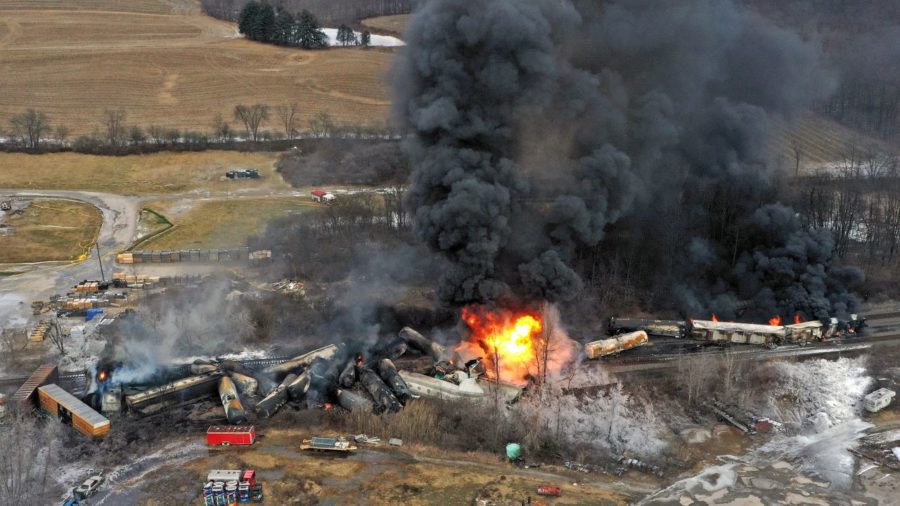Officials say train derailment in East Palestine, Ohio no longer hazardous to locals
A catastrophic train derailment in East Palestine, Ohio released many hazardous chemicals including vinyl chloride, which can cause cancer and other serious health conditions.
Around 9 p.m. on Friday, Feb. 3, a train from Norfolk Southern Railway (NSR) traveling from Illinois to Pennsylvania derailed and burst into flames in East Palestine, Ohio. This small village on the Pennsylvania-Ohio border is just 90 minutes southeast of the Case Western Reserve University campus. About 50 of the train’s cars derailed; of these cars, around 10 to 20 contained hazardous materials, and five of these cars contained vinyl chloride, an artificially made, and colorless, flammable gas, typically used in the manufacturing of polyvinyl chloride (PVC).
Vinyl chloride becomes extremely reactive when in contact with air, sunlight, heat or moisture, and is associated with the increased risk of various forms of liver, brain and lung cancers, as well as leukemia and lymphoma. If inhaled, it has also been known to cause drowsiness, gastrointestinal bleeding, low blood oxygen levels, seizures, deterioration to the central nervous system and death. Additionally, vinyl chloride can enter household air if the water supply is contaminated, as it evaporates easily when exposed to air.
Because of the proximity of the fire, officials became extremely concerned that the train cars containing the vinyl chloride would ignite and explode, sending deadly shrapnel as far as a mile away from the crash site. “This catastrophic failure, if it occurs, will produce hydrogen chloride and phosgene gas into the atmosphere,” elaborated East Palestine Fire Chief Keith Drabick.
The town immediately issued an emergency evacuation of residents within one mile of the fire, which expanded to a two-square mile evacuation order from Ohio Gov. Mike DeWine, as well as Pennsylvania Gov. Josh Shapiro. The fire continued to burn for four days afterwards, until it finally reduced on Monday afternoon. At this point, the vinyl chloride was released via “small, shaped charges,” which was used to “blow a small hole into each rail car,” releasing the pressure-liquified vinyl chloride into a trench, then immediately igniting it before it could polymerize.
The National and Ohio Environmental Protection Agencies, as well as the 52nd Civil Support Team of the Ohio National Guard, all participated in taking air and water samples and determining if levels of vinyl chloride and its combustion byproducts were low enough to be considered safe.
On Wednesday, Feb. 8, Gov. DeWine, Fire Chief Drabick, among other leaders of groups in charge of assessing the accident, announced that the fire was completely extinguished and that residents are now safe to be back within previously evacuated limits. Crews have also been removing some of the wreckage, and no injuries were reported. However, some residents reported smelling chlorine and having headaches.
Before the accident had occurred, the National Transportation Safety Board was alerted of “preliminary indications of mechanical issues on one of the axles” of a train car. Despite this, the emergency brake was activated when the alarm was sounded at the time of the crash.
Because of this, local business owners and residents in East Palestine are filing a class action lawsuit against Norfolk Southern Railway, with the group seeking up to $5 million in damages for those forced to evacuate due to the emergency. The suit alleges that the derailment, chemical exposure and subsequent immediate evacuation was “caused by the negligence” of Norfolk Southern Railway, specifically, “in the operation of the subject train, defects in NSR’s track system, and/or defects in one or more of the cars.” The suit asks NSR to release all studies and reports pertaining to the derailment and vinyl chloride to be released to the public. NSR has not yet responded to the suit.

Sara Khorshidi (she/her) is a fifth-year student majoring in biomedical engineering and minoring in polymer science and engineering. Outside of school,...


